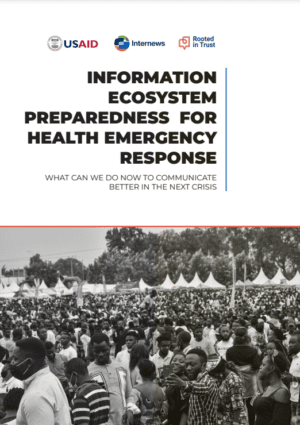The detrimental effects of the COVID-19 pandemic, along with heightened risks increasing the potential for future health emergencies, have prompted a collective reevaluation of health emergency preparedness from various perspectives. International agencies, heads of states, and the public health community are deeply engaged in reassessing the role of health in global security and preparedness structures. In such conversations, the role of communication and infodemic management has been highlighted to ensure people have access to timely, accurate, and evidence-based information that supports also building trust in public health systems and authorities.
We would argue that access to such information is crucial, and we appreciate the recognition of infodemic-related structures as central to health emergency preparedness. Nevertheless, further steps need to be considered to build trust. These require sustained and adequate structures that go beyond standalone “information-based interventions” and consider longer-term, ecosystem-building approaches. In this sense, programs that focus on communication as a standalone method for influencing concrete behaviors often rely on debated assumptions:
Information ecosystem preparedness for health emergencies refers to building resilience for health communicators and information response actors ahead of the hazardous event, identifying gaps in capacities, systems, processes and structures and finding relevant solutions that are community-led and sustainable in time. This will ultimately ensure actors and networks can function collectively in the face of health-threatening events.
This research, conducted in DRC, Mali and South Sudan, aims at exploring the current gaps of information ecosystem preparedness for health emergencies through the conceptual lens of network-building, which sheds some light on potential strategies to build more solid processes, systems and capacity for effective Risk Communication and Community Engagement (RCCE) in health emergencies.
The research is guided by three main objectives:
- To deepen our understanding of the diverse challenges and gaps faced by information ecosystem actors to be better prepared for a health emergency,
- To identify the obstacles hindering cooperation for strengthened preparedness capacity in information responses during a health emergency, and
- To identify strategies, approaches and interventions that can contribute to a healthier information ecosystem better prepared to face a health emergency, contributing ultimately to greater preparedness.
The conclusion section focuses on the common areas of concern identified throughout the section of gaps and barriers, and a series of recommendations to address along the 4 key elements of the preparedness: 1) governance, coordination and collaboration, 2) Information systems and planning, 3) Capacity and 4) Funding.
For any questions, please get in touch with Rocío López Iñigo, Community Engagement and Accountability Advisor of Rooted in Trust, at [email protected]
